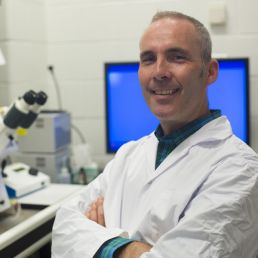‘Not until the past decade did sleep take centre stage in our understanding of general health and well-being,’ says sleep scientist Professor John Peever. ‘Now, with an increasing awareness of how sleep is pivotal in guiding healthy lifestyle choices, we are starting to develop a more holistic idea of what sleep health looks like.’
Peever is President-Elect of the Canadian Sleep Society (CSS), a national organization that aims to improve sleep for Canadians through driving sleep research, enhancing clinical care, and educating the public. Beyond Peever’s research, he is also a strong advocate for raising Canadians’ awareness of sleep science through public health campaigns.
‘Sleep is just as important as diet and exercise, only easier – that is the message I aim to put out’, asserts Peever. “I am really looking forward to working with my colleagues in Canada as well as on an international scale with other national sleep societies.” Peever is proud that major strides in insomnia and sleep apnea research have been taken by Canadian scientists.
As a leader, Peever views his first responsibility to be listening to the ideas of his trainees and then making decisions for his laboratory to bring their ideas to fruition. He hopes to bring out the best in his trainees and is deeply grateful for their hard work. As President, he plans to take the input of the sleep research community and implement the vision that comes out of their views.
Peever will ensure a broad spectrum of voices are present on the CSS board of directors by increasing gender, racial, geographic, and age diversity. To support Canada’s next generation of sleep scientists, Peever particularly solicits input from younger scientists. CSS currently has two PhD students on the board of directors and hosts a bi-annual conference with events that recognize trainee research.
Prof Peever’s laboratory in Toronto investigates how disruptions in sleep contribute to neurological disorders. Using a combination of cutting-edge neuroscience tools such as optogenetics and chemogenetics, the Peever lab aims to elucidate the brain circuits involved in sleep. Peever takes a special interest in REM sleep in relation to narcolepsy and Parkinson’s disease.
Their probes into the neural mechanisms of sleep are often guided by clinical observations. “We take clinical observations of sleep disorder symptoms and test them at the experimental level”, says Peever. “For instance, what would happen if we manipulated a brain area that clinicians found to be associated with narcolepsy?”
Narcolepsy is a sleep disorder where the brain struggles to regulate normal sleep-wake cycles. A recent discovery from his lab manipulated the REM sleep circuit to show how a specific region of the brain is linked to symptoms of narcolepsy such as sleepiness.
Raised in the countryside, Peever is an avid beekeeper and horseman. As a child in his local library, he initially acquired his fascination with the brain. When he recently learned that his dairy farmer neighbour had a trove of data on cattle activity, Peever instigated a project to investigate any correlations between the sleeping patterns of cows and milk production.
In being elected as the President of the CSS, Peever reflects that he feels “humbled that a basic scientist has been given the confidence of not only guiding basic science, but also the clinical domains.” Peever’s understanding of the broad clinical picture and ability to connect it to basic science enhances his expertise in the wider field of sleep research.
Congratulations, Professor Peever, on your new role!

